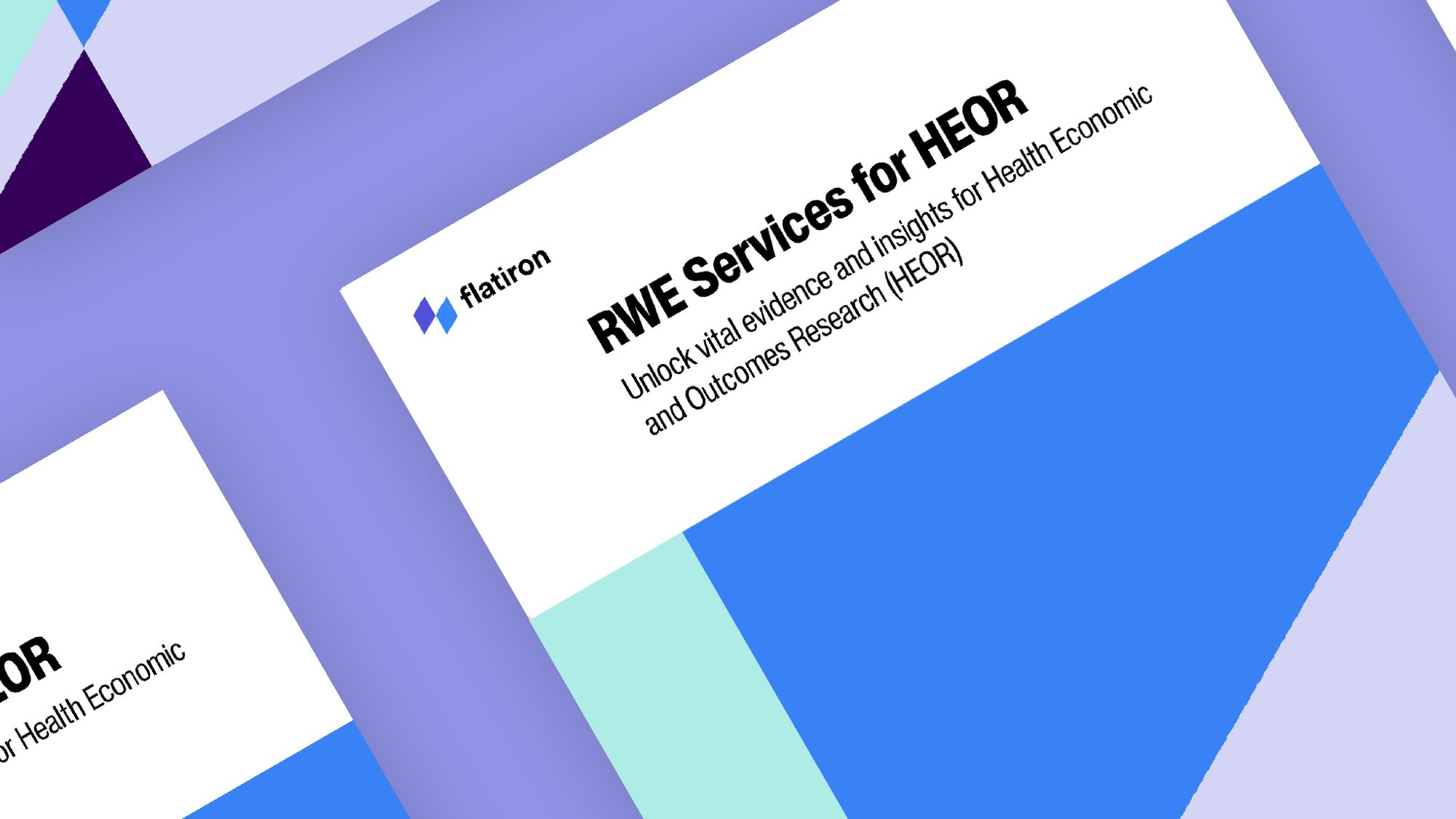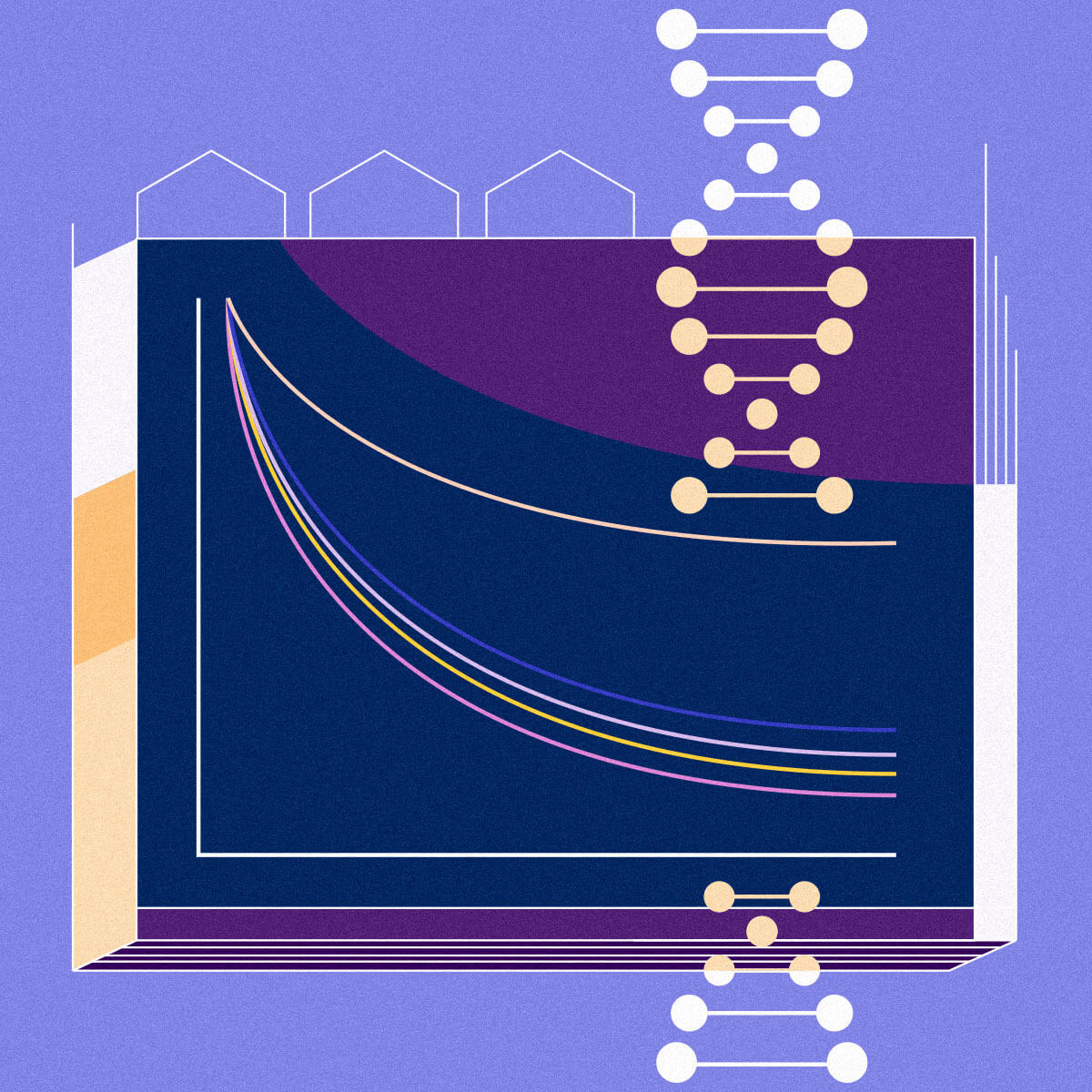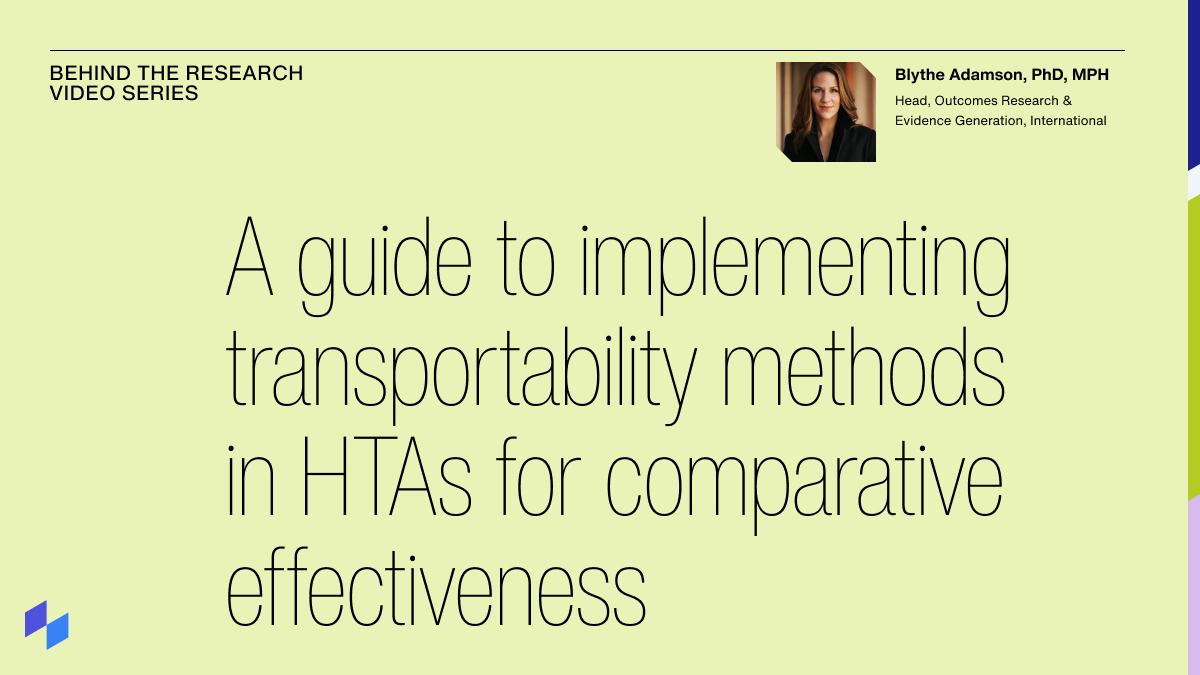Flatiron Health at ISPOR 2024
Flatiron is honored to attend and showcase our research at ISPOR 2024, supporting this year’s theme of health economics and outcomes research (HEOR) as a “transformative force for whole health.”
Unlock critical evidence to accelerate access to cancer treatments worldwide
At Flatiron, we are unlocking HEOR evidence and insights to demonstrate the value of oncology treatments to stakeholders including payers, regulators, and providers. By leveraging our industry leading US and ex-US oncology data assets and expertise, we’re generating a spectrum of tailored solutions configured for the specific evidence needs of life sciences companies.
Our research explores methodological approaches and considerations for health outcomes research, use of AI and large language models to advance evidence generation, among other topics. Join our experts at booth #319 to discover how Flatiron is transforming the possibilities of oncology research, development, and access.
Featured Workshop
Quantify to qualify: A quantitative bias analysis workshop to bust bias and drive trustworthy data-driven decision making in real-world evidence
Tuesday, May 7 | 5–6 PM ET
Real-world data (RWD) and real-world evidence (RWE) are vital to inform HEOR decision-making, but real-world studies often include biases that may lead to erroneous conclusions if unaccounted for. Quantitative bias analysis (QBA) offers a systematic way to address these biases, yet is routinely underutilized.
This workshop aims to bridge that gap, featuring experts sharing practical QBA applications across drug development.
Speakers

Stephen Duffield, PhD, MD
National Institute for Health and Care Excellence

Xiaoliang (Wendy) Wang, PhD, MPH
Flatiron Health

Grace Hsu, MSc
Cytel

Gregory Sampang Calip, PharmD, MPH, PhD
AbbVie
Visit us at booth #319
Flatiron has both the expertise and the comprehensive data you need—whether evaluating health outcomes in specific patient cohorts or understanding treatment sequencing and testing patterns across tumor types.
Unlock vital insights for HEOR with Flatiron's Evidence Solutions
By leveraging our industry leading oncology data and expertise, we’re unlocking powerful insights for HEOR use cases.
Perspectives on RWE use for Medicare drug price negotiations in oncology
We walk through five use cases where real-world evidence can support life sciences companies in their negotiations with CMS.
Featured use case
Accelerate market access with Flatiron's RWE and HTA expertise
A trusted leader in oncology real-world data and evidence generation, Flatiron supports life science partners in planning and executing RWE HEOR studies, particularly in support of HTAs.
Our featured experts at ISPOR
Blythe Adamson, PhD, MPH
Head, Outcomes Research & Evidence Generation, International
Our research
Read more about our accepted research at this year’s conference.
Prevalence and incidence of ROS1 and NTRK rearrangements in real-world patients with advanced non-small cell lung cancer in the United States
Author affiliations: Bristol-Myers Squibb, University of North Carolina, Chapel Hill, University of Colorado Cancer Center, Flatiron Health
Recent advances in targeted therapies benefit patients with advanced non-small cell lung cancer, particularly those with ROS1 (ROS1+) and NTRK (NTRK+) rearrangements. However, limited biomarker testing data hinders understanding of the burden of disease and its economic implications. This study addresses this gap by examining ROS1 and NTRK biomarker prevalence in the US NSCLC population through comprehensive genomic profiling and patient characteristics among biomarker positive cohorts, informing personalized treatment and healthcare policy for improved outcomes.
See this research
Date: Monday, May 6
Time: 10:30AM-1:30PM
Poster Session: 1
Poster Code: EPH49
Connect with a flatiron expert
Xinran Ma, MS
Senior Research Scientist
Connect on LinkedIn
Racial and ethnic inequities in endometrial cancer survival from 2017 to 2022: Assessing the influence of social determinants of health
Author affiliations: Flatiron Health
Amidst the rising incidence of endometrial cancer, concerns are mounting about exacerbated inequities during the COVID-19 pandemic due to care delays. This study examines recent endometrial cancer survival, focusing on racial inequities and the role of social determinants of health (SDOH). It uncovers persistent survival gaps, particularly among Black patients compared to their White counterparts, both before and after the pandemic, and highlights the significant influence of clinical and SDOH factors. Addressing the drivers of later and more aggressive disease in Black patients is essential for improving endometrial cancer outcomes and advancing health equity.
See this research
Date: Monday, May 6
Time: 10:30AM-1:30PM
Poster Session: 1
Poster Code: HPR9
Connect with a flatiron expert
Olive Mbah, PhD, MHS
Senior Health Equity Scientist
Connect on LinkedIn
Oncology practice setting classification in the US: Considerations for real world evidence
Author affiliations: Flatiron Health
In oncology real-world evidence (RWE) studies, variations in treatment patterns and patient characteristics often complicate the analysis due to differences in practice. Furthermore, the lack of a standardized classification methodology for oncology practices in the US poses challenges in addressing these complexities effectively.
This study evaluates existing classification schemes used in RWE studies and summarizes practice characteristics of the Flatiron Health Research Database. Similar to academic sites, some community oncology practices have high patient volume and conduct clinical trials. Researchers should not assume community oncology practices are homogeneous.
See this research
Date: Monday, May 6
Time: 10:30AM-1:30PM
Poster Session: 1
Poster Code: HSD9
Connect with a flatiron expert
Eric Meadows, PhD
Director Scientific Engagement
Connect on LinkedIn
Performance assessment of a disease-agnostic treatment sequencing heuristic for deriving line of therapy in a real-world, rare, multi-tumor cohort across tumor mutational burden status
Author affiliations: Flatiron Health
Deriving clinically-appropriate treatment sequences across different cancers poses challenges in retrospective studies. This study introduces a new heuristic approach to tackle this issue. By identifying treatment sequences across a spectrum of cancer types, it enables a deeper understanding of treatment patterns in multi-tumor analyses, including biomarker-defined cohorts.
See this research
Date: Monday, May 6
Time: 3:30-6:30PM
Poster Session: 2
Poster Code: HSD42
Connect with a flatiron expert
Lilia Bouzit, MS
Research Scientist
Connect on LinkedIn
Evaluating real-world response-based endpoint in the clinical trial settings among aNSCLC, mCRC and mBC patients
Author affiliations: Flatiron Health
Understanding real-world response rates (rwRR) is crucial for comprehending clinical outcomes outside of oncology clinical trials. Using machine learning, this study examines rwRR in lung, colon, and breast cancer patient cohorts aligned with clinical trials. By providing significant insights into treatment response rates beyond clinical trials, the research aims to deepen our understanding of the relationship between endpoints in trials and real-world data.
See this research
Date: Tuesday, May 7
Time: 3:30-6:30PM
Poster Session: 4
Poster Code: MSR79
Connect with a flatiron expert
Cherie Zhang, MS
Senior Research Scientist
Connect on LinkedIn
Assessing the potential value of the Flatiron Health commercial mortality data combined with publicly available death data for non-oncology research
Author affiliations: Flatiron Health
Combining mortality data from EHRs, commercial databases, and the US Social Security Death Index (SSDI) offers reliable measures in oncology research. This study explores using Flatiron Health's commercial mortality database and SSDI data alone as an alternative for research without EHR access. The findings have significant implications for mortality research beyond oncology, providing a valuable alternative for mortality assessment in settings without EHR data. With viable levels of sensitivity and specificity, this approach provides a near-real time option for mortality outcomes in diverse research contexts.
See this research
Date: Tuesday, May 7
Time: 3:30-6:30PM
Poster Session: 4
Poster Code: RWD141
Connect with a flatiron expert
Matthew Reynolds, PhD
Head Evidence Scientific Engagement Lead
Connect on LinkedIn
Using large language models to extract PD-L1 testing details from electronic health records
Author affiliations: Flatiron Health
This study assesses the effectiveness of large language models (LLMs) to extract key PD-L1 details (test date, percent staining, etc) from a diverse medical record database, spanning numerous different cancer types. The research demonstrated that LLMs were able to perform this complicated task and were more effective in extracting these clinical details after being fine-tuned using human labeled examples. The work showcases the potential of these models to expedite access to crucial data from the EHR to inform treatment decisions and facilitate research. It also highlights the importance of high quality labeled data to improve and understand performance of these LLMs.
See this research
Date: Tuesday, May 7
Time: 3:30-6:30PM
Poster Session: 4
Poster Code: MSR64
Connect with a flatiron expert
Aaron Cohen, MD, MS
Senior Medical Director, Machine Learning
Connect on LinkedIn
Related Research
Learn more about Flatiron's HEOR expertise
Request a meeting
Looking for support in designing and executing HEOR studies with RWE?
Leverage Flatiron’s industry leading US and ex-US oncology data assets and expertise to drive your real-world studies, including:
-
Evaluating comparative- and cost-effectiveness
-
Modeling long-term survival
-
Examining burden of illness
-
Analyzing treatment patterns
Reach out to learn more about how we partner to accelerate patient access to oncology therapies across the globe.


















